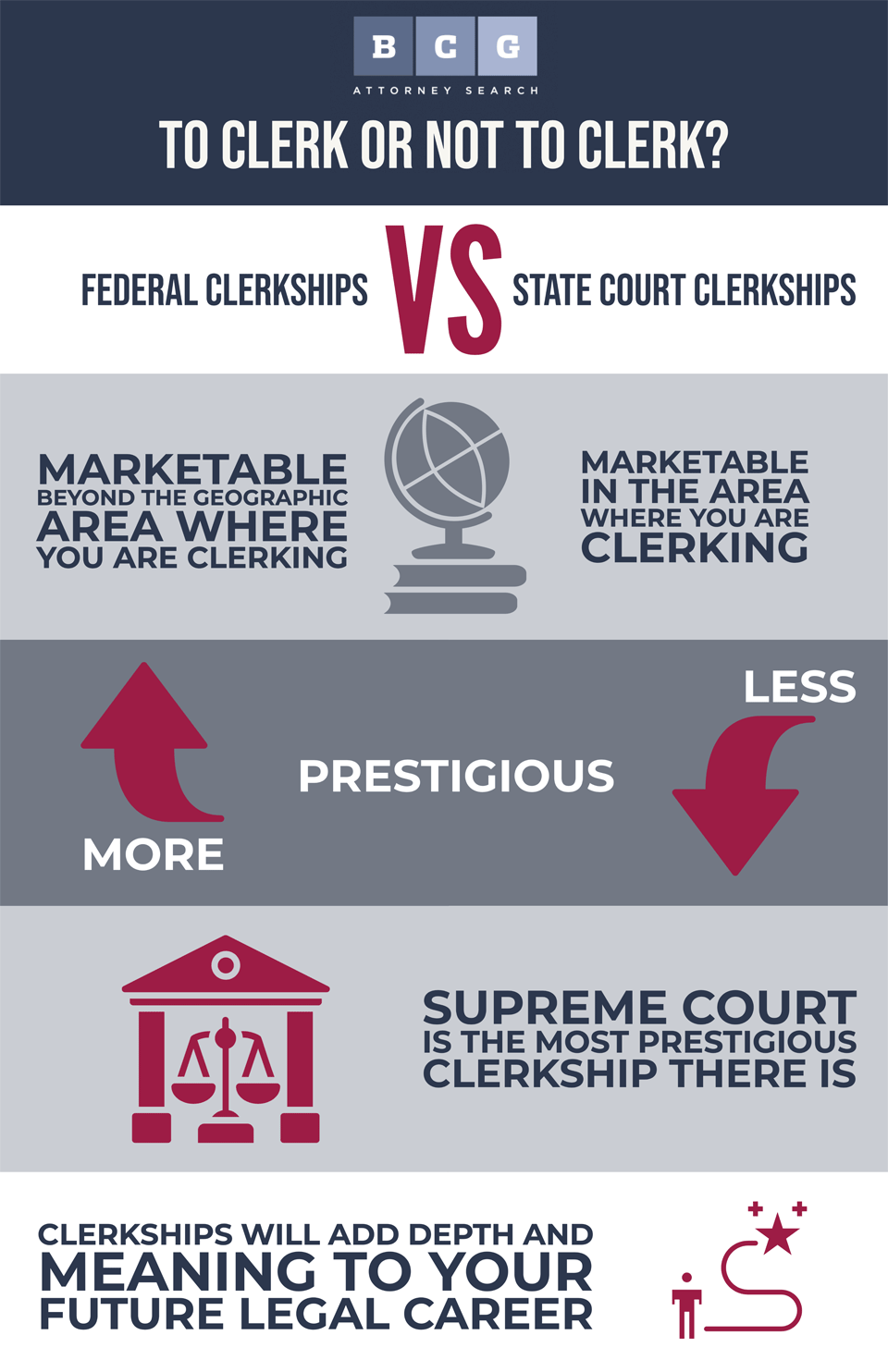will make you marketable, it is important to understand the differences between state and federal clerkships. These distinctions are examined below.
Typically, the most prestigious clerkships have been those with federal judges.
Given the prestige of a federal clerkship, it can often make you marketable far beyond the geographic area where you are clerking.
At the federal level, the order of prestige of clerkships is typically (1) the Supreme Court, (2) circuit (appellate) clerkships, (3) federal district court (trial court) clerkships, and (4) clerkships with United States magistrates (who do a lot of the grunt work for federal district court judges). There are also several specialized courts (such as Federal Tax Court) that are of approximately the same prestige level as federal district court clerkships. For obvious reasons, clerking for the Chief Justice of the United States Supreme Court is generally considered the most prestigious clerkship there is. Similarly, a clerkship with a federal district judge in the Eastern District of New York is more prestigious than a clerkship with a federal district judge in Bay City, Michigan, for example, because there are far more people competing for clerkships in larger metro areas. Attorneys who clerk for the most prestigious judges are typically those whose marketability is likely to be increased as a result.
Most attorneys applying for federal clerkships apply to work either for federal district judges (district court clerkships) or for federal appellate judges. District court clerkships involve actual issues being litigated at the trial court level and typically have more in-court action. In a district court clerkship, you may see many of the same lawyers in court day in and day out. In a circuit court clerkship, you are likely to see the attorneys involved only when they present their appellate arguments in court. Appellate clerkships involve mainly research and writing about issues the trial court has already ruled upon and reviewing the District Court's errors. Appellate clerkships typically involve more arcane and novel issues of law than are typically litigated at the trial level.
In an appellate clerkship, you are less likely to get to know the lawyers involved in the underlying litigation.
B. State Court Clerkships
There are also different distinctions in the state court system; ordinarily, you will also have a Supreme Court, appellate courts, and trial courts. The same prestige distinctions are also present at the state level, with a state Supreme Court clerkship being the most prestigious. Just as certain federal district courts in various geographical locations are considered prestigious places to clerk in, so too are the state courts in different states. In general, if you are clerking for an appellate court in a highly populated state, this will be more prestigious than if you are doing the same thing in a smaller state.
The problem with a state court clerkship is typically something that is also an advantage. While a state court clerkship will not necessarily increase your chances of being marketable anywhere throughout the United States, it can do you a tremendous amount of good in the area where you are clerking. Clerking for a state court will make you a candidate with important local contacts. The fact of the matter is that most litigation (even at the
most prestigious law firms) is conducted in state, not federal courts. Accordingly, a state court clerkship will provide you with a better understanding of state law than you would ever get as a federal clerk. If you are planning on working in the area where you are clerking, the state court clerkship should be enormously valuable.
C. Final Thoughts about Clerking
You need to remember that considering accepting a clerkship is much like mulling where to go to law school. There are major national law schools that vary in prestige, and there are smaller local law schools that vary in prestige. For example,
attending a law school like Yale is going to give you a serious advantage when you are applying to
law firm positions throughout the United States. A law school like Yale might be compared to clerking on the Supreme Court. Conversely, a smaller, more local law school like the University of Toledo is not going to give you as much an advantage throughout the United States. This school will, however, probably give you good options in Toledo, Ohio.
Accordingly, before you accept a clerkship, you need to have a good understanding of whether or not you want to work in the area where you will be clerking. The clerkship is most likely going to make you marketable if you are seeking to work in the state where you are clerking. You should also do some research regarding where various judges' former clerks ended up working. By acquiring this information, you can also get a decent idea of what your marketability might be following the clerkship.
The value of your clerkship should not necessarily be viewed as a tool to make you marketable. Clerking is something that gives you tools and memories that most clerks carry with them throughout their careers. When you sit on the judge's side of the bench, you get the feeling that you are really part of the legal process and have the idea of how decisions are made and the implications these decisions have on peoples' lives. Most clerks describe the year they spent clerking as the most relaxing, intellectually challenging, and interesting year of their lives. And this is really the essence of a clerkship. It allows you to see the inner workings of the legal system, work closely with a judge, and will provide you with a level of illumination about the legal system itself that you will carry with you throughout your
legal career.
Our belief is that you should not clerk simply because you think it is something that will get you a better position. A clerkship is something that you should do because it will add depth and meaning to your future legal career. We do not believe that a state court clerkship (especially with an appellate judge) can possibly hurt your marketability. Indeed, the skills and understanding you pick up during your clerkship will be carried with you throughout your career.
Click here to contact Harrison









